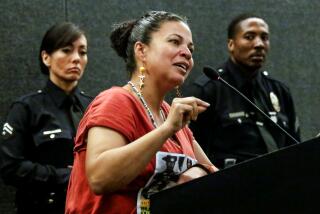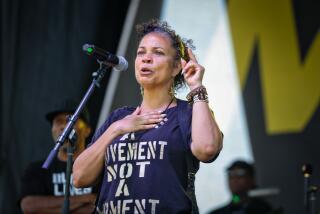A Milestone for Afghan Justice -- or Lack of It
KABUL, Afghanistan — KABUL, Afghanistan -- In his last days of freedom, Abdullah Shah -- a brutal moujahedeen with many enemies -- was living like a fugitive in two squalid rooms in the poorest part of Kabul with Gul Makai, the woman unfortunate enough to be his fifth wife.
Ten days after their wedding, the 20-year-old bride fled the house into a narrow, stinking lane, screaming that her husband had killed other wives and was trying to kill her.
Abdullah Shah, 37, was arrested. He was later tried and convicted, not for the alleged slayings of wives but for the murders of 13 civilians in the early 1990s, during the country’s vicious civil war. Sentenced to death Oct. 15, he could become the first person executed by the state in post-Taliban Afghanistan. His case is under appeal, but the former moujahedeen commander seems to have run out of friends powerful enough to save him from hanging.
Amrudin Qate, chief prosecutor of Afghanistan’s secondary national security court, claims that Abdullah Shah is a psychopathic fiend who killed dozens or even hundreds of people, including three wives and three children, one a baby whom he tore limb from limb.
Villagers about 10 miles north of here in the Qargha area, where Abdullah Shah had his military base, allege that he killed hundreds of civilians in the early 1990s after the moujahedeen defeated the nation’s communist regime and took power, unleashing civil war and a reign of terror in the Kabul region.
“He’s the worst criminal we have. No one even knows how many people he killed,” said Qate, adding that 30 people signed complaints against Abdullah Shah.
The case is the first against an Afghan moujahedeen commander for war crimes. However, authorities have shown a marked reluctance to investigate the full scope of Abdullah Shah’s actions and find out whether the allegations of widespread killings are true.
Judge Was Sacked
Abdullah Shah’s trial was a shoddy process that highlighted the failures of Afghanistan’s court system. One judge was sacked for bribery after the first court imposed a 20-year sentence. A second trial hastily sentenced Abdullah Shah to death. As is common here, the defendant had no lawyer.
International human rights monitors have criticized the proceedings, and a U.N. representative called for a halt to the death penalty in Afghanistan until international standards for imposing capital punishment could be met.
The many war crimes committed during the long and brutal civil conflict still haunt this country, but the lack of a thorough investigation into the many allegations against Abdullah Shah suggests that Afghanistan is not yet ready for an effective war crimes tribunal or a truth and reconciliation commission.
The worst accusation against Abdullah Shah is that he was responsible for an alleged massacre of 40 to 50 ethnic Hazara civilians in 1994. Abdul Razaq, 37, an unemployed clerk from Qalai Kashef village, where the commander was based, claims that in one instance, he saw Abdullah Shah line up 15 or 16 Hazaras and order a soldier to fire a rocket-propelled grenade to see how many of them would fall.
But the accusation of a massacre was neither included in his trial nor fully investigated. Asked why, Qate replied that in a country like Afghanistan, witnesses lacked the courage to testify.
“We didn’t need any more evidence,” he said. “We have 13 people who said he killed their relatives. We have enough stuff.”
In an interview before his trial, Abdullah Shah, shackled in leg irons, denied all allegations against him, insisting that they were trumped up by enemies in a feud over water and land.
There is a simple key to unlock the main accusation against Abdullah Shah: It would take spades and some diggers to uncover the truth. In dusty Deh Araban village, near his base, lies a well 5 yards wide and 25 yards deep, filled in with dirt. Villagers claim that Abdullah Shah buried dozens of bodies there, including those of the Hazaras. Villagers petitioned authorities last month to dig up the well, fearful that they would face retribution if they did so themselves.
But criminal investigators have no plans for exhumation, saying it would cost too much.
According to villagers, Abdullah Shah massacred civilians largely because of their ethnicity or the fact that they worked for the communist regime. If that is true, he was like many other commanders in the early 1990s.
They also say he kidnapped people to extort money and was violent toward his wives. That contributes to the depiction of him now as a monster far more brutal than other commanders, many of whom still hold powerful positions.
Gul Makai wrapped herself in a long blue shawl with white flowers as she told the story of her marriage to Abdullah Shah, a man who still terrifies her.
She said Abdullah Shah took her by force, threatening her family if they did not turn her over.
“I knew he was a killer,” she said. “I didn’t want to lose any of my brothers, so I agreed to marry him.”
Five days after the wedding, her husband smoked hashish and became violent, she said.
“Then he beat me and knocked my two front teeth out,” she said. “He would hit me with anything that came to hand. If he caught you when he was angry, he would take your flesh in his teeth and bite you. He’s a sick man. I think he’s crazy.”
Gul Makai fled in such terror and panic that she had no time to grab a head-to-toe burka or an Islamic head scarf, so her neighbors blocked her from running down the street to the police. She went into a neighbor’s house and begged, weeping, to borrow a burka.
Another wife, Sohaila, 30, who was married to Abdullah Shah for six months, has more harrowing stories. A shrunken, frail and defeated figure who lies on her bed under a blanket all day, she shows photos of the strong, plump widow she says she was before marrying the commander.
She alleges that he bit her shoulders, beat her repeatedly with a metal pipe and threw a kettle of boiling water on her as she lay in bed. Her body is pitted with horrific scars, but her psyche seems even more damaged as she weeps and wishes for her life to be over.
Investigation Lacking
The fate of three earlier wives is a mystery. Abdullah Shah says they died of illness. Qate alleges that the commander strangled one in Iran and killed another in Pakistan with boiling water. The prosecutor also says that Abdullah Shah smashed two children against a wall as they cried and that he ripped one baby apart.
But little investigation was conducted into the allegations, which were outside Afghan jurisdiction and not part of the trial.
One of the wives, Bibi Asea, died in 1999 in Pakistan. Her brother, Sahar Gul, 29, a farmer and former moujahedeen, described how she came to him begging for refuge from her violent husband about seven years ago, but he sent her back to him.
“I told her: ‘He’s your husband. He did well. While you are alive, you belong to him. When you die, your body belongs to us,’ ” Sahar Gul said.
After her death, the local mullah told the woman’s brothers that she had burns and a gunshot wound in her head, her brother said.
He said Abdullah Shah at different times killed two babies born to his sister, a 1-month-old son and a 6-week-old daughter.
Mohammed Aman, 53, is a teacher who trained in the Soviet Union and was labeled a communist by Abdullah Shah. Aman’s son was shot eight years ago by gunmen on his wedding night, and he named Abdullah Shah as his attacker while he lay bleeding to death.
“My son said, ‘You must take vengeance on him.’ Five minutes later, he died,” said Aman, struggling to speak through tears.
There are inconsistencies in accounts of the massacre of Hazaras, an ethnic minority in Afghanistan. Some say about 50 refugees were arrested in a bus and taken to Abdullah Shah’s base, then later shot in groups of 12 or so. Other accounts claim that the commander incinerated the bus.
Qate says his investigators found witnesses, but they “didn’t want to make problems for themselves.”
“I’m not so crazy as to be a witness in court,” said Razaq, the man who said he saw Abdullah Shah order a soldier to fire a grenade at a line of Hazaras. “I don’t want my face on television so his soldiers can come and kill me.”
Another villager, Gul Mohammed, 36, who said he saw Abdullah Shah’s soldiers shoot 12 Hazaras and dump their bodies in the well, also refused to testify.
“We’re not as brave as that,” he said. “He didn’t kill anyone from my family, so I don’t need to be a witness against him in court.”
Prosecutors also made little effort to investigate which commander Abdullah Shah answered to, perhaps to avoid stirring up difficulties with one possible associate: Abdulrab Rasul Sayyaf, a Northern Alliance commander who retains power.
Qate, the prosecutor, asserts that Abdullah Shah was a Taliban member and also had ties to warlord Gulbuddin Hekmatyar, of the Hezb-i-Islami party, who fought against the nation’s moujahedeen leaders in the early 1990s and is opposed to the current government.
Abdullah Shah says he fled Afghanistan for Pakistan and Iran during the Taliban era. He also says he was initially under Sayyaf’s command, but later fell out with him. Sayyaf has denied any ties to Abdullah Shah.
At the time the Hazaras allegedly were killed, the moujahedeen group associated with Sayyaf was fighting the Hazaras in Kabul, the Afghan capital.
“Now I am friendless,” Abdullah Shah said. The former commander’s isolation might help explain why he faces the death penalty and other commanders do not.
Dr. Abdul Sabor Mohamedi, 50, who works at a government hospital in Kabul, alleges that Abdullah Shah dragged the physician’s 16-year-old brother from a car in 1992, took him to a forest, shot him dead, then cut off his nose and ears.
He said Afghanistan’s fragile stability and the frictions between competing commanders make it difficult to investigate the crimes of the past and punish those responsible.
“All Afghans hate the moujahedeen. They’re enemies of the people. They were all inhuman. All of them should be investigated and tried,” he said. “But now the whole government is associated with the jihadi commanders, so it’s impossible to do it now.”
More to Read
Sign up for Essential California
The most important California stories and recommendations in your inbox every morning.
You may occasionally receive promotional content from the Los Angeles Times.










